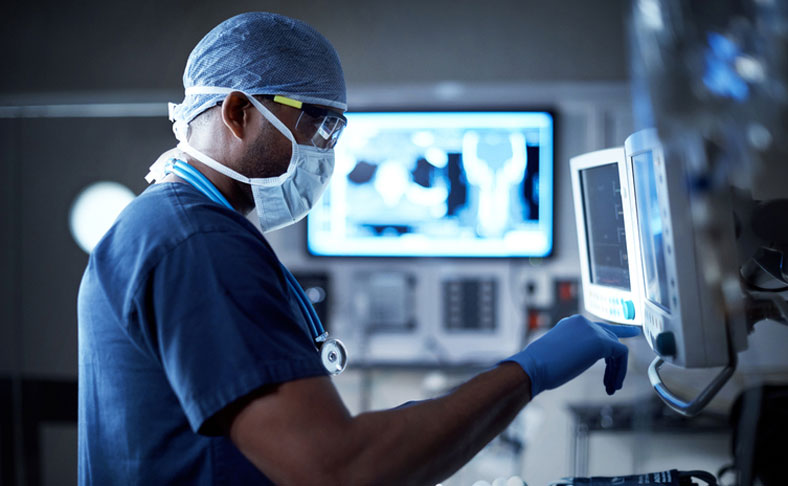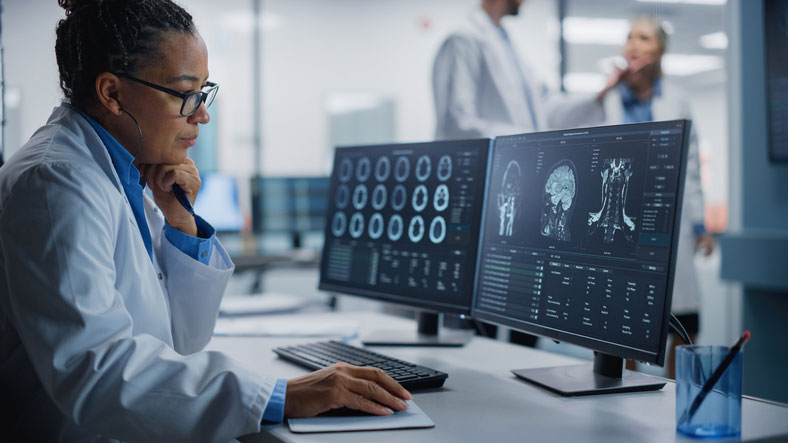Anyone working in the field of nursing today can attest to the tremendous role technology has played in reshaping the medical profession. Indeed, with every passing year, new tools arrive that are designed to make medicine more effective, precise, and accessible.
In this day and age, incorporating new technologies into one’s medical procedures isn’t an occasional deviation from the norm – it’s a regular part of the nursing profession, one that is cause for excitement and encouragement.
After all, technology emerges to solve problems, whether they exist in the clinical context or the administrative one. This means that working nurses can see improvements in care delivery over the course of their careers, sometimes due to technological innovations that transform their work overnight.

For all of the enthusiasm medical professionals have for new technology, these innovations also require a great amount of work to adjust and adapt, with no small amount of troubleshooting. Advanced practitioner registered nurses are instrumental in leading their teams to embrace and understand the new technologies they are working with and the new order of operations these new tools can bring about.
This article will give an overview of the ways that technological advancements have transformed advanced nursing practice as well as the healthcare field in general. It also provides information for registered nurses looking to level up, with information about the top graduate nursing programs to bring you to the next stage of your career. To learn more about these exciting developments in healthcare technology, read on.
Technological Advancements in Healthcare
There would be no medical profession without technology. In fact, the story of medicine is one of technological advancement – one only needs to imagine medical practices of one hundred years ago to understand that new instruments have been perpetually reinventing the field to provide better, safer, and faster care.
However, it is fair to acknowledge that the arrival of digital technology has led to significant advancements at an exceptionally rapid clip – enough that older medical professionals who have been working for many years may find their day to day duties almost completely transformed from what they once were. Indeed, those who are entering graduate nursing degree programs now are fortunate, as their schooling is likely to help them acclimate to the digital technologies that others had to learn while already on the job.
There are two primary ways that technology has transformed medicine: by improving patient care, safety, and outcomes, and by improving healthcare delivery models and workflows.
In a graduate nursing degree program, you are likely to learn how to harness new technologies to do your best work in both of these arenas. Read on to learn about these two important aspects of technology-driven healthcare.
Improving patient care
Perhaps the most visible way that technology has transformed medicine is by refining (and in some cases radically innovating upon) treatment methods for a huge variety of medical issues. From updates to surgical instruments to improving screening tools, advanced technology has created once-unthinkable solutions for long-time issues.
In recent years, one of the most exciting and powerful new frontiers of healthcare brought in by the digital sphere is personalized medicine, which draws from data analytics and machine learning to provide detailed portraits of patients’ genetic makeups, risk factors for diseases and illnesses, and most optimal treatment methods. These are known as health informatics, and they are a crucial example of data analytics and artificial intelligence (AI) in nursing.
Other ways that patient care has improved includes the following:
- Real-time data collection and analysis for personalized care
- Patient engagement and self-management tools
- Wearable devices and health monitoring technologies
- Patient education and health promotion through digital platforms
Improving delivery models and workflows
While innovations in patient care are the most eye-catching forms of technological advancement in medicine, technology has also led to tremendous strides in delivery efficiency, improving the ways hospitals are run and making care easier and more accessible for patients of all types. As a nurse beginning your career today, you will benefit from these expedited internal systems, which have significantly eased the administrative burden on nurses to do things such as monitoring patient care, keeping records accurate and up to date, and more.
To learn more about the specific ways technology has improved the landscape for nurses, read the sections below.
Integration of Technology in Advanced Nursing Practice
Nurses are uniquely impacted by new medical technologies, which in many cases have completely transformed routine clinical practices. These are likely to be covered in graduate nursing programs, giving you a complete orientation and background information that may not have been provided to you as an RN.
Here are just a few of the most notable ways nurses benefit from new technologies.
Electronic Health Records (EHRs) and health information systems
Electronic health records (EHRs) have done wonders for the administrative side of nursing. By streamlining and centralizing patient information, they make it easily accessible to healthcare providers. This has eliminated the need for manual record-keeping, reducing the risk of errors and improving the efficiency of patient care. Physicians can now access comprehensive medical histories, test results, and treatment plans with just a few clicks, allowing for more informed decision-making and coordinated care across different healthcare settings.
Telehealth and remote patient monitoring
Telemedicine is another recent game-changer in patient care, one that significantly impacts nurses’ day-to-day duties. This is a transformation that was accelerated during the COVID-19 pandemic, which ushered in a new era of remote healthcare that has proven to be so efficient that it’s surely here to stay.
With the help of digital communication tools and video conferencing platforms, nurses can now provide consultations to patients remotely, regardless of their geographical location. It has also enabled virtual follow-ups and remote monitoring of patients, reducing the need for frequent in-person visits and improving patient convenience. Indeed, beyond making healthcare more accessible for patients, telehealth and telemedicine also significantly expedite appointments, making it possible to deliver care to larger numbers of people.
Point-of-care technologies and mobile health applications
Another boon for nurses is the embrace of point-of-care technologies and mobile health applications, which relieve nurses of many of their administrative duties so that they can focus more directly on care. By eliminating paper-based records and replacing them with digital applications, recordkeeping is made significantly more efficient as well as more accurate, with information updated far more regularly than in the days of printed documents. Many of these applications (mHealth being among the most notable) also provide channels of communication between nurses that allow the instant transmission of useful information, saving time and effort.
Some clinics have also embraced the use of wearable devices in nursing, which are typically given to patients who are regularly being monitored for their health stats. These devices are capable of remote patient monitoring, providing up-to-the-minute information that in some cases can save patients an in-person visit and give nurses more time to focus on patients who require their direct attention.
Clinical Decision Support Systems
Another way that nurses have been greatly aided by technology is with Clinical Decision Support Systems (CDSS), which are applications that analyze data to help healthcare practitioners determine a patient’s medical needs and find an appropriate course of treatment for them. By providing evidence-based practices, they make it possible for nurses to take on vastly different types of cases, expanding the possibilities for the types of care they can provide. To be clear, this does not mean that nurses are therefore expected to forgo training in these capacities; rather, the education graduate nursing programs provide helps future advanced practitioners understand the ins and outs of CDSS programs and how they can be used to improve and accelerate care models.

Technology and Advanced Nursing Roles
So how do these technological innovations affect the role of advanced practitioner registered nurses? For one thing, it comes down to leadership: since a graduate nursing degree will give you authoritative status among your cohort, it’s imperative that you have a deep understanding of the tools and practices at your disposal.
Indeed, as an advanced practitioner registered nurse, you will be expected to spearhead technology-enabled care coordination.
As a decisionmaker and patient advocate, it will be your responsibility to select the care modalities that will promote the best outcomes and ensure an efficient clinic. Graduate nursing programs will help you learn how to leverage technology to do the most you possibly can while imparting this knowledge onto your team as well.
There are also some advanced practitioner nurses who choose to specialize in particular technological tools. This can become a concentration within your graduate nursing degree, giving you a unique and valuable skill set that is likely to land you excellent work opportunities.
Advanced Healthcare Technology: Ethical and Legal Considerations
As an advanced practitioner nurse, you are likely to be entrusted with key decisions surrounding patient care and delivery. This means you will need a strong foundation in the ethical and legal considerations behind new healthcare technologies. Fortunately, this is something most graduate nursing programs will include in their education.
Some of these ethical considerations include:
- Protecting patient privacy and confidentiality
- Maintaining transparency about the use of data-driven information
- Complying with legal guidelines for use of new technologies
As you can see, for all of the convenience of advanced technology in nursing, there are also new bodies of knowledge that it requires nurses to possess. This is one way that your graduate nursing degree will equip you to become an informed and ethical leader in your cohort.
Training and Education for Technology Integration
Since technological advancement is happening at such a rapid rate, contemporary healthcare practitioners are not only expected to have a familiarity with existing systems, but also stay actively engaged with new innovations that are transforming their work in real time. This means ongoing training and professional development, as some new systems require vastly different skill sets and approaches than those that are being replaced.
How graduate nursing programs teach new healthcare technologies
Building technology competencies is now an important part of graduate nursing programs.
Anyone who pursues a graduate nursing degree is likely to receive a thorough orientation in the most up-to-date nursing technologies and systems – from patient engagement technology to clinical decision support systems and more.
These courses will make you an expert at using these advanced systems, also providing you with insight into the future of medical technology and what you can expect to see in your years to come as a practitioner.
Continuing education for working nurses
For nurses who don’t wish to pursue graduate nursing degrees – or even for those who already hold them – many clinics as well as nonprofit organizations offer continuing education courses and workshops to keep your skills up to date and relevant on the job. There are many doctors and medical administrators who also pursue this education, as all medical personnel benefit from a deep knowledge of how these technologies work.

Becoming a nurse who embraces the future of medicine
As the article above illustrates, technology has been a tremendous force in the improvement of medicine, making nurses’ jobs easier and more impactful at the same time. If you are a working nurse, it’s important to stay invested in learning about the innovations that are continuing to happen with every passing day so that you can do the most for your patients.
If you are a working registered nurse who is interested in taking the next steps in your career, a graduate nursing degree will qualify you for leadership positions in your area of specialty. You can learn more about graduate nursing careers in our guide here.
For more information on graduate nursing programs, take a look at our school listings and our index of schools by state.
For answers to all other questions, visit our homepage here.
FAQs
Is the use of new medical technology standardized across hospitals and clinics?
It depends. With so much new technology suddenly available to medical professionals, different clinical contexts embrace new instruments at different rates. This is partly to ensure that new systems will be taken on when a caregiving team has the ability to learn and implement it fully – after all, these systems are used in critical contexts, so it’s imperative for all personnel to have thorough training and for all procedures and guidelines to be thoroughly thought through.
What are salaries for advanced practitioner registered nurses?
According to the Bureau of Labor Statistics, in May 2022 registered nurses earned a mean annual salary of $89,010. While their data does not differentiate between advanced practitioners and those who just hold BSWs, it is typically the case that a graduate nursing degree will make you eligible for higher-paying roles. Because of this, it is worth noting that the top 90th percentile of registered nurses earns a mean annual wage of $129,400.
I have no background in data or computer science. Will I be able to keep up?
Yes. Many healthcare professionals are in the same boat as you, and have been able to adapt to the changing landscape of the medical profession comfortably. In fact, you are more likely to find that these instruments help you do your job more easily than that they are stressful to learn.



